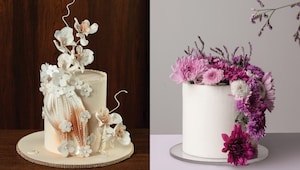#CosmoInEverySize: The unfiltered reality of body positivity influencers
The body positivity movement changed how we talk about size and self-worth—but for the women leading it, the battle is far from over.

My 11-year-old niece loves crafts—she's been making origami and home-organisation videos since she was nine, our little Marie Kondo—which she then shares with the family, and we love it. Lately, though, she has been hesitant to show up in front of the camera. She explained to her mother, who relayed it to me, “I don’t think I can do it because I don’t have features like all the women who are always making videos these days.” I was at a loss for words. I wanted to say something encouraging to her, but I didn’t really know what. It felt like I didn't have enough to back me up.
The entire episode made me wonder about the content that’s waiting to be explored by preteens and teens. Why are we still scrutinising people, especially women, through the lens of their appearance? Why is the current obsession with thinness via drugs and steroids not making people cringe? Where are all the voices that promoted body positivity, which seemed so amplified on social media only yesterday? I needed answers.
According to Tanvi Geetha Ravishankar, a body positivity and lifestyle influencer, “These voices are dwindling, especially in India”. And upon closer examination, the reasons are sinister.
Trolling, toxicity, and grit
Imagine this: Your new reel garners one million views, gets more than 200 comments, and is shared some 100 times. Great stats for Instagram, but for influencers and content creators like Ravishankar, Ashna Bhagwani, and Amena Azeez, who have been at the forefront of promoting self-love regardless of size, this engagement comes with a bitter side of hate. From digs at their styling choices to comments about their character, trolls say it all, and rather blatantly.
Bhagwani says, “The one thing I’ve learned over the years is that it’s a really hard pill for people to swallow that someone can actually be happy and confident in their own body, no matter the size. It makes people uncomfortable, and that says more about them than about me.”
Ravishankar seconds the sentiment, “I have learned that the disconnect (between body positivity messages and the persistent harmful comments) says more about the world we live in than about me. On one side, we see people celebrating confidence and inclusivity, and on the other, there’s still deep conditioning around fat bodies and beauty standards.”
But this is not a today problem. While the body positivity movement has empowered many women to accept themselves with confidence, content creators within the space have gradually been silenced. Sometimes with trolling and hate comments, other times by fad diets and a fanatic obsession with thin bodies. What, then, has kept them going?
Amena Azeez, one of India’s first plus-size fashion and body positive bloggers, says, “Even during the peak of the body positivity movement, hateful comments and trolling did not stop. However, my attitude towards my body changed, and that made it possible for me to handle the trolls better. This space was created by women like me, and it is my safe space. Even with all its flaws and shortcomings, this is the only space that offers me acceptance. That is why I continue to be a part of it.”
For Bhagwani, it is an ongoing attempt to challenge childhood impressions and fundamental ideas and prevalent practices, especially in India. “Growing up, I remember flipping through magazines such as Stardust and Filmfare, where actresses were constantly picked apart for their bodies. Every issue had headlines shaming someone for gaining weight or not looking a certain way. It had a negative impact on me. For me, the biggest motivation to continue doing what I do is to be able to reach every young girl, especially in India, where relatives, society, and the media often don’t miss a chance to bring women down. I want that girl to know she’s enough just as she is.”
Ravishankar has faced backlash, too. She confesses, “I have contemplated stepping away many times, especially now with the obsession with thinness being on steroids! Swimming against the tide is often exhausting and lonely. Changing the narrative around bigger bodies was already a challenge, add to it constant online hate and bullying and the realisation that many voices that have previously stood for the movement were just performing all the while. Trolls will troll, but the DMs I get from people saying, 'You made me take a picture of myself for the first time in 10 years,' matter more. That’s why I keep going.”
The before, the after, and the in-between: body transformations
Whether it’s a social do or a media moment, women’s bodies are constantly scrutinised, sensationalised. They are inspected for pounds gained and pounds lost. For instance, Bhumi Pednekar was applauded for being “brave” to take on a role where she didn’t fit the traditional definition of an “actress’ body” for her debut. At first glance, this may not be a reason to raise eyebrows, but statements like these subtly convey a message that only a certain type of body can be deserving of a leading role. Ironically, Pednekar was later also trolled for losing weight. These double standards have been equally applicable to Sara Ali Khan, Kusha Kapila, Adele, and so many others around the world.
Bhagwani has experienced this conundrum first-hand. She says, “For generations, everything about a woman—what she wears, eats, looks like, achieves, or loses—has been turned into entertainment. I don’t understand why a woman’s body has to be constant gossip fodder or up for debate. It’s important to stop making women’s bodies a public conversation and just let women live on their own terms. I’ve gone through so many body transformations myself. I’ve taken the before-and-after photos in the past, and a lot of it came from a place of self-hate. Now, when my focus is on being a stronger and healthier version of myself, even that gets scrutinised. People say, 'Oh, so you’re a body-positive influencer and now you want to lose weight?' The truth is, it’s a complex space. I’m all for supporting women, no matter their size, but I’m strongly against fad diets and the toxic narrative that you have to starve yourself to be skinny. For me, the real difference is whether it comes from self-love or self-hate.”
Azeez adds, “I think people tend to obsess over body transformations because it is the most noticeable thing in any individual, especially celebrities. This is something that will never change, no matter how hard we try. The best way to deal with it is by not letting it affect you. On the other hand, many of these celebrities were plus-size or non-skinny before. Unfortunately, they used the body positivity movement to their advantage and profited from it. When that served their purpose, they decided to join the bandwagon and lose weight.”
For Ravishankar, self-worth has always been beyond bodies. “Our culture treats bodies like breaking news; gain a little weight or lose a little weight, and suddenly your entire worth is up for public debate. This obsession with transformation keeps us trapped in the idea that our bodies are projects and not homes. We need to move away from applauding or criticising bodies for how they look and instead ask what the person’s body is allowing them to do, feel, and experience.”
However, she, too, like Azeez, feels that there have been instances where body positivity has been used to grab eyeballs and be “on-trend”. This, she feels, is betraying the movement. “We all know that bodies change naturally with age, health or lifestyle, but when someone who once loudly proclaimed love for their larger body suddenly talks about how unhappy or unhealthy they felt in it, it reinforces harmful stereotypes like a fat body is automatically an unhealthy body. This undoing of progress is not just damaging for individuals but also for the community as a whole. I do believe that we need to stop policing women’s bodies, but I also understand why women who were part of the body positivity community get stronger backlash when they 'intentionally' pursue weight loss through fad diets, pills, restrictive eating, or surgery. It feels like a betrayal. These are the very things the movement was created to fight against.”
What does a meaningful evolution of the body positivity movement look like?
The consensus is this: Take the representation and respect beyond social media and into real life. “Body positivity was never just about posting cute outfit pictures. It is about how people of all sizes and colours, differently-abled, and basically everyone outside the narrow beauty standard are treated in everyday life. It’s about shedding the bias they face in public spaces, workplaces, or even in the opportunities they’re given, all because of how they look. For the movement to truly evolve, these are the conversations we need to keep having,” says Bhagwani.
What can both influencers and audiences do to further this? Ravishankar has ideas: “Body positivity was created to fight oppressive standards that tell us thinness, youth, and Eurocentric beauty are the only ideals worth aspiring to. If we start accepting fad diets, surgeries and quick-fix solutions as 'personal choice', we risk diluting the very core of the movement. Influencers have the responsibility to represent this honestly and not treat it like a clout-driven hashtag but to hold space for uncomfortable truths, systemic critique, and authentic storytelling. Audiences, in turn, need to be open to learning about body diversity, hold us accountable, engage critically, and unlearn the instinct to comment on other people’s appearances. The most radical thing we could do as a culture is to make how someone looks the least interesting thing about them.”
Azeez concludes, “Meaningful evolution would be to shift the narrative from its current discourse back to its core values. Stop focusing on optics and actually having meaningful conversations about it. And call out every brand and celebrity/ influencer who uses this as a marketing tool.”
Body positivity influencers have been at the forefront of shifting how we see and speak about bodies—pushing against shame, stereotypes, and silence. Their work has helped young women reimagine what confidence can look like, beyond size or shape. Yet, the constant trolling and scrutiny they endure are a reminder of how deeply ingrained these biases are, and how much further we have to go.
Lead image: Getty Images
Also read: #CosmoInEverySize: Has body positivity become just another trend?
Also read: Why you can’t heal in the same group chat that hurt you
more from Life

Genius hack or pathway to loneliness? The dawn of dating’s spreadsheet era

I tried Pantene's Bond Repair Conditioner and here’s what it changed about my styling routine

Low-rise jeans are squeezing back into fashion—here’s how to wear them in 2026

I travel for a living—these are the top 15 tips I've learned to avoid skin freak-outs and overweight luggage

All the hottest beauty finds that make us sit up and take notice

Will we ever stop hating it when women propose to men?

Breezy summer outfits that keep you cool and effortlessly chic

Is Gen Z going analogue amid an epidemic of disconnection?

Are you an “echoist?”

Inside the rise of impossible-to-ignore cakes and the bakers making them worth the splurge
